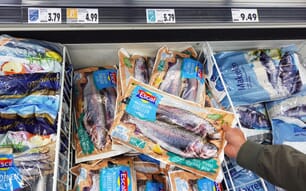The workshop was opened by the Hon. Vice Minister and Secretary of State for Agriculture, Forestry and Fisheries, H.E. Chan Tongyves, and was graced by the Vice-Governor, H.E. Chan Sophal, Siem Reap Province, the Director General of the Fisheries Administration, H.E. Nao Thuok, and FAO representative for Cambodia, Mr. Ajay Markanday, reported the Network of Aquaculture Centres Asia-Pacific (NACA) earlier this week.
According to NACA, epresentatives from nine NACA member countries (Cambodia, China, Lao PDR, Myanmar, Thailand, Vietnam, India, Indonesia and Bangladesh) participated in the workshop and made country presentations and case studies relevant to the theme of the workshop. Three senior professional officers from FAO (FIIU) and two professional officers from NACA participated.
A total of 26 presentations were made at the workshop. The presentations and the ensuing discussions focused on the following thematic areas:
- Marketing and value chains of low value cultured fish.
- Fish products from low valued cultured fish.
- Bio-security and human health issues associated with the consumption of low value fish and their products.
- Nutritional value of low value cultured fish.
- Diseases of low value cultured fish and development of BMPs of important low valued cultured commodities.
- Consumption patterns of fish globally and in the region.
The workshop identified important R&D issues for taking follow up activities in the Lower Mekong Basin countries. Important R&D issues identified during the workshop included:
- Need for further work on food safety and public health issues associated with fish borne zoonotic parasites (FZP) (e.g. fish borne trematodes such as liver fluke) in most countries of the region, particularly where fish is consumed in raw condition or as various fermented products (e.g. fish paste).
- Need for further work on sero-typing of Salmonella associated with low valued cultured fish and their products.
- Need for developing better management practices for low value cultured fish in order to address the food safety and fish health issues.
- Need for developing better handling, transportation and processing practices to counter human health related issues and reduced post harvest handling losses, which is presently estimated between 30-40 per cent.
- Need to improve market chains in respect of low valued cultured fish and to popularize the nutritional benefits of consumption of low valued commodities.
- In the region low valued fish are transformed into many products, such as fermented fish, fish paste etc. These are traditional practices that have remained unchanged and unimproved over the years. As such there is need to investigate the efficacies of conversion of wild caught and cultured indigenous freshwater fish to major fishery products in Asian countries.
FAO and NACA will work together to follow up on some of the recommendations relevant to the Lower Mekong Basin Countries.
The workshop also included a half-day field visit to the Greta Lake (Tonle Sap), when the participants were able to observe a variety of aquaculture and fishing activities, house hold processing of aquatic products and which provided the opportunity to interact with small-scale aquaculture farmers.




